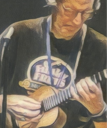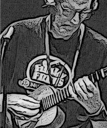Learning Ukulele with Curt
Ukulele Study Plans, Evaluating Your Ukulele Music Knowledge...
Self-Assessment can be one of the hardest things to do when it comes to your music development. How can you know what you don't know? If you're not sure of your current level, here are several tips and points to keep in mind for figuring where you are at in your musical development.
What Level Ukulele Player Are You?
Self-assessment can be one of the hardest things to do when it comes to your music development. The best way to determine your current level is to book a lesson or two with a seasoned, experienced ukulele expert—one with a lot of experience teaching all levels of players. Keep in mind that not all great players can actually teach or explain what they do.
Book a Single Lesson with Curt , in person or virtually via ZOOM, or FaceTime for an analysis of your current level and discuss your goals. I can help you develop a plan for future development—regardless of who your current teacher is or if you're going it alone. I don't teach someone to play like me—there is already one of me. I will help you develop your own
voiceon the ukulele and grow as a musician who plays the ukulele. Take advantage of the hundreds of ukulele players I've helped over the years.
NOTE: You might be a Beginner in one aspect of your learning and Intermediate or Advanced in other areas.
This is especially true if you have experience playing other instruments, or have focused on one aspect of your playing.
Most beginners think they are intermediate players, and most intermediate players think they are advanced. Advanced players typically know what they need to work on and think there are more intermediate than advanced players. My take is, every player is ALL three. Everyone should be a beginner–as you're always beginning the next phase in your artistic development. I know personally what area of my playing I need to work on.
Chords are a great place and indicator of a ukulele players current level:
- Beginner: C Am F G7 . Maybe C7, Dm, Em, etc... The essential major, minor, and seventh chords using the Open Position Chords . These are the chords utilizing the first three or four frets of the ukulele and include at least one open string.
- Intermediate: The Open Position Chords chords transposed up the fingerboard, with any open strings replaced with a finger(s) or a barre. There are the A/Bb, C/Db, D/Eb, F/Gb, G/Ab Movable Form Chords . Your diminished, diminished seventh, and augmented chords.
- Advanced: The Big Six - Level I Chords — These are 7, m7, maj7, m7b5, dim7, aug. These are 4-part contemporary chords, commonly called "jazz" chords. You derive these chords from the open position A7, E7, G7, C7 chords.
- Master: Levels II, III, IV, and beyond
Jazz
chords , and you can create any chord you'll need based on a solid foundation of chords and how chords are built and used.
With the Intermediate and above levels, you really need to start to know the ukulele fingerboard notes. When well into more advanced levels and beyond, it is imperative that you flat out know the ukulele fingerboard, and they are on instant recall and second nature.
Scales are another good indicator of your current level:
- Beginner: This is typically an intermediate chord player starting to learn the Blues and Pentatonic scales. Two of the Six Essential Scales for a contemporary ukulele players.
- Intermediate: The Major, Natural Minor, Mixolydian, and Dorian scale. The rest of the Six Essential Scales . You're starting to explore arpeggios and intervals.
- Advanced: The Seven Modes , Altered Mixolydian scales, Whole Tone and Diminished scale, Exploring Improvisation Using Tetrachords . Basically, everything else you need to know for your style of music. Your essential scales, arpeggios, intervals, and sequences.
As you can see, it's tough to create a general appraisal of a ukulele player without actually knowing that particular player, their experience, goals, and technical abilities. An experienced teacher can help out. It's often hard to evaluate yourself, identifying where you are in your development. An outside set of ears and eyes can help determine the right course of development, depending on your goals.
You basically need to develop a professional level music curriculum using all the elements that would be typically covered in a well rounded musical education. See the The Elements of a Successful Music Program page for information on what is involved.
Teaching Yourself
Teaching yourself can be frustrating at times. One problem with going the self-taught route is the glut of information available online—even right here on the LearningUkulele.com–Learning Ukulele with Curt
site. There's no one controlling the flow of information, no one to guide you from the necessary foundation skills and knowledge needed for more advanced concepts on any particular topic. Patience is paramount with yourself and crucial—there's nothing in the world that someone hasn't managed to learn, starting from right where you are now. And it's probably written somewhere, either in a book or accessible online.
For someone new to ukulele, start with this Series of Weekly Lessons that will help you create a core foundation for future development. And, fill in some gaps in your existing knowledge and skills. It's actually a good review no matter what level you are.
Self-assessment is typically challenging to do when you don't know what to study or how to approach organizing all the possibilities. It's not until you get a bit further along in your development that you can determine what is needed. However, there is one area that is difficult to do on your own. And that is technique.
For technique, it's important to get someone who understands the mechanics involved and, more importantly, can communicate what is required. Think of the parallel to sports coaching and how it's typically not the great players who are the great coaches and managers. Musicians are no different. It's the rare few that can handle both.

Beginner Players
Beginner Chords: C Am F G7, Maybe C7, Dm, Em, etc... The basic Open Position Chords major, minor and a few seventh chords.
A Beginner ukulele player is just starting out with ukulele and pretty much knows nothing about the ukulele or music — a clean slate. This is a great place to start, no bad habits, a blank musical canvas and only forward progress is possible. You're just beginning your musical journey with this wonderful instrument.
A Beginner might know a chord or two. Probably needs some work switching between chords and playing in time. A beginner might only know the names of the open strings, as you need those so you can tune your ukulele — but not much more.
A little beyond the beginning stages is when you can switch between simple chords, if you are familiar with the song. A beginner needs to have the chords written to play the song or have someone teach you the song. A beginner only knows the basic chords in open position.
A beginner's strumming patterns typically consists of one or two patterns learned by ear or on-line with the verbal instruction to the hand's stroke direction, i.e., down down up type of instructions. A beginner doesn't know any scale patterns or have the ability to improvise or play single note lines or melodies.
A Good Starting Point
Most beginner ukulele players will mainly be strumming and playing songs in group jams, Meetups, etc… So, it's these skills that need developing.
I've created a series of weekly (or longer) lessons that you can go at your own pace. These are great for getting you started towards the goal of play in several common keys and some basic strums with a bit more information and technical skills thrown in to the mix.

Intermediate Players
Intermediate players are starting to venture in to the land of Movable Form Chords: A/Bb form, C/Db form, D/Eb form, F/Gb form, G/Ab form. Your diminished, diminished seventh and augments chords.
An Intermediate player can hold a steady rhythm. Knows the basic open position chords E Em E7, A Am A7, D Dm D7, C C7, G, G7, F and B7. Can figure out the primary I, IV and V of the common keys C, G, D, A and E. Can play major, minor, and seventh movable form chords up and down the fingerboard. Can figure out the name of a note on the fingerboard.
An intermediate player can hear when chords change in a song or progression. Usually learns new songs from friends or tablature (TAB). If making their arrangements, they are usually fairly simple. An intermediate player knows there's life above the fifth fret, but not what to do with it.
An intermediate player can sing and strum at the same time easily; learns chords to simple tunes fairly quickly.

Advanced Players
Advanced: The Big Six — Level I Chords , 7, m7, maj7, m7b5, dim7, aug7 4-part contemporary chords, commonly called
jazzchords. These are based on the open position A7, E7, G7, C7.
An Advanced player should know the fingerboard across the strings and along the strings. Be able to instantaneously identify any note on the fingerboard — this needs to be second nature.
An advanced player should be able to read music and know where the notes are on the fingerboard. They might not be able to sightread on demand — but read to figure out and learn new material.
An advanced player can play any chord that is required. They have an understanding of open position chords, movable form chords and 4-part, aka “Jazz” chords.
An advanced player can hear I, IV, and V chords, has mastered chord inversions, knows there is life above the fifth fret. Plays lead and backup easily with others and keeps steady rhythm.
An advanced player knows the difference between a scale and a mode.
An advanced player knows the names of the notes in the chords they are playing.

Master,
KumuPlayers
Master: Levels
II
,
III
,
IV
, and beyond of
Jazzchords. Then, basically, you can create any chord you'll need based on your solid foundation of chords and how chords are constructed and used.
A Master ukulele player, a ukulele guru, kumu — Think Otha San, James Hill, Jake Shimabukuro, Benny Chong.



These are the ukulele masters, gurus, and players that stand out from the masses. I would through in names like Herb Otha, Jr., Abe Lagrimas, Jr. , Neal Chin . I'm sure there are a few others I'm missing. Notice how
Jazzplayers show up on these lists. It's the rich harmonic content and improvisational nature of jazz that make one rise to that level.
A master ukulele player is really a master musician who happens to play the ukulele.
A master ukulele player knows the principles of music and can apply them to the ukulele. A master has studied for years and years and is always learning and developing.
Some have called me (Curt), your LearningUkulele.com—Learning Ukulele with Curt kumu a ukulele master, virtuoso, and ukulele guru — and after 30 plus years of SERIOUS study as a jazz guitarist and 50 years of music. With the last 20+ plus years totally dedicated to applying those skills and knowledge to ukulele. I'll leave it up to others to place me in a category.
Curt, your CD was fantastic. You are among the ukulele masters of our day. —
John K. (Ko'olau Guitar & Ukulele)
(From a posting to the jazz guitar newsgroup to another poster) Rocco, I took a lesson from a guy named Curt Sheller, who lives in Pottstown, PA area. Depending on where you live in the Philly area, that might be a bit of a drive for you, but he is well worth it. He's an excellent teacher. I took a lesson from him a couple of months ago, and had planned on taking a one-hour lesson per month from him, but then my work required me to travel almost every week since then, and so I haven't been able to master the assignments he gave me so far.
I have taken single lessons from a few teachers in the area, and he is by far the best I've seen.
He is the only guy that I could find that is truly flexible in terms of scheduling, and to top it off, he's the best teacher for the guitar I've ever found as well… —— Bob
Should You Study Music With A Teacher or Should You "Wing" It On You Own?
This question always comes up in this type of discussion about music.
Here is Chuck Anderson's take on the question.
An objective assessment of the two alternative approaches leads me (Chuck Anderson) invariably towards the formal route. Why? Because without guidance, there is a tendency to go in circles, What do you practice, when do you move to the next topic? When are you doing something wrong? How do you practice what doesn't exist to you?— Chuck Anderson.

🚀 🚧 End of LearningUkulele.com Site Content 🚧 🌍




.jpg)